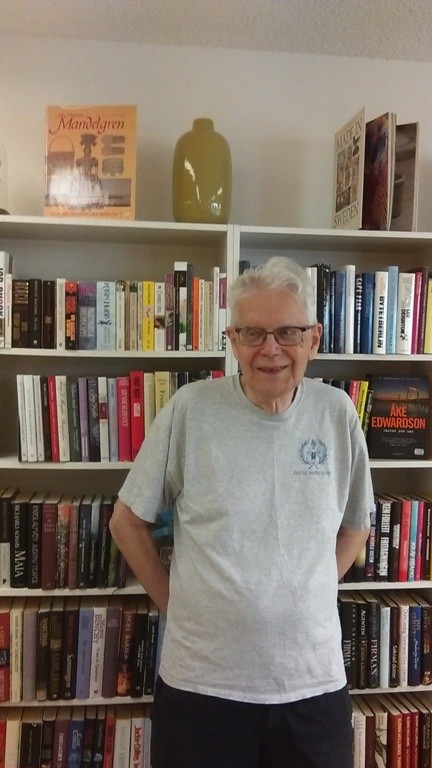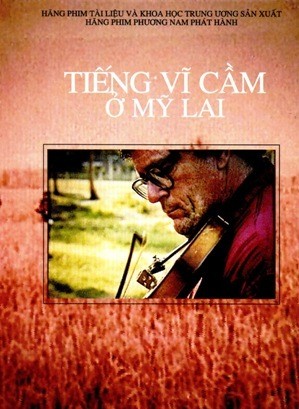(VOVworld) - I’m reading a letter from Ullmar Qvick, a shortwave enthusiast from Sweden. He was one of the founders of the Arctic Radio Club back in the 1960. It’s still very much alive, Qvick said.
B: It’s great to see your photos and know that at the age of 81, you’re still active with a Red Cross youth project. I hope that your broken arm has fully recovered.
A: Ullmar listened to our program on July 20 on the frequency of 7280 khz from 19:00 to 19:27 UTC. He marked SINPO rating at all 4s with good signals and audibility. Ullmar wrote: “The collaboration between Radio France and Voice of Vietnam is certainly a useful decision. I hope it will be of mutual value. The 9730 kHz channel unfortunately is useless during this transmission due to total interference from CRI in Beijing which is operating on the frequency, unauthorized.”
B: We’ll forward your technical remark to VOV’s Audio Technology Center to process. We sincerely thank you for your remark about a male speaker who has got a very good and agreeable voice but speaks too fast and often contracts the words. We’re always willing to learn from other’s experience and listeners’ comments to improve our broadcast.

Ullmar Qvick of Sweden |
A: Our regular listener Richard Nowak of the US emailed us his feedback immediately after listening to one of our programs. He often tunes into the frequency of 12005 kHz from 1:00 to 1:27 UTC. On July 21 he informed us that there were lots of silent periods during the program. “The audio went out very often in the first 10 minutes. The first minute the audio went silent 4 times. Most of the Vietnam news wasn’t heard. World news was a little better and then the audio became a little more stable after 1:13 UTC.”
B: On July 22 he said the show was great and reception was fabulous. He enjoyed the news and coverage of the economy and the segment on amateur singers was interesting. There were no gaps in the audio that night.
A: In his latest report on July 25, Richard said the audio was going silent almost constantly. He experienced similar problems on July 21. Signal strength is fine but audio keeps going out. A lot of the show prior to 1:14 was not heard.
B: We’re so sorry to hear that. This week we got a lot of technical remarks from listeners. Gerry Neumann of England informed us that the Moosbrunn transmitter was not on air at 17UTC on Tuesday, July 13, for the English and following broadcasts. We highly appreciate your daily technical reports and our technicians will take them into serious consideration.
A: Yeah. It’s pity that poor transmission upsets our listeners. VOV’s transmission was not that bad in other areas. Nicolo Comin, a police officer in Albosaggia, Italy, reported about a program on July 16 on the frequency of 9730 khz. He wrote: “It was the first time that I received Radio Voice of VN and I was excited to listen to it. After a short research by my PC, I concluded that it was really Radio Voice of VN and the reception was good. If there were some interference, maybe because of my makeshift antenna, but the stability of the signal was optimal.”
B: Oh, I feel good again with Nicolo’s feedback. Welcome to VOV’s D’xing worldwide community. We’ll send you our latest frequency list and program guide so you can easily tune in to our channel when you have free time.
A: MD.Rana from Bangladesh emailed us to say “I’m a regular listener to your station. Your programs inform their listeners with news from Asia and around the world. The news items are current and unbiased. They are vivid and right from the source. The features bring in every aspect of your country and portray them nicely. The mail bag program sows the seeds of friendship across the globe. Your answers for our questions are knowledgeable.”
B: Thank you very much for your nice words. We’re glad that you find our information interesting and useful. Your reception report for the program on July 22 on 9550 khz was correct and we’ll confirm it with our QSL card soon. Another Dx’er from Bangladesh Dewan Rafiqul Islam told us “For me your station is a good friend and the best teacher. I always find it a lot of fun to learn with your station and my life becomes a lot more interesting because of your station.”
A: Rana, I’m speechless with your compliment.
B: Just say thank you very much my friend. You’ve been listening and writing to us for years. Thank you for your support for shortwave and introducing VOV’s program to your club members.
B: You said you want to know about Vietnam’s lifestyle, cinema, and food, and much more. I hope you can come to Vietnam one day to personally experience it. Until then, we’ll tell you about the cinemas and movies of Vietnam.
A: Vietnamese cinema began in the 1920s with several early documentaries during the era of silent films, before sound was introduced in 1937. During the wars which took place during the 1940s and 1970s, cinema was mainly concerned with propaganda films and commentaries on the war and life in Vietnam.
B: Documentaries and feature films attracted attention at film festivals in Eastern Europe at the time. Several films from this period have become legends and have been screened again and again on national TV to mark historical occasions.
A: Since the late 1980s the number of films produced in Vietnam has increased. The Vietnamese film industry has recently experienced an upsurge and many movies are celebrated nationwide and at international film festivals.
B: The shift to a market economy in 1986 blew a fresh air into the Vietnamese filmmaking industry. Tony Bui's Three Seasons won prizes at the Sundance Film festival in 1998. Trần Văn Thủy's The Sound of the Violin at My Lai won Best Short Film prize at the 43rd Asia Pacific Film festival in 1999. Sandy Life by Nguyễn Thanh won best picture at the same festival the following year. Bùi Thạc Chuyên's Night Cyclo Trip won third prize in the short film category at the Cannes Film Festival in 2000.

The Sound of the Violin at My Lai |
A: I think the best known, however, are films by overseas Vietnamese directors such as Tran Anh Hung and Tony Bui. Tran's first feature, The Scent of the Green Papaya won the Golden Camera at the Cannes Film Festival in 1993 and was the first Vietnamese film nominated for an Oscar in 1994. His other films include Cyclo in 1995 and Vertical Ray of the Sun in 2000. Another European co-production, The buffalo boy by Nguyễn Võ Nghiêm Minh, won many awards at film festivals, including the Chicago International Film Festival in 2004.
B: But the number of Vietnamese movies produced every year is still modest. 41 Vietnamese movies were produced against 199 foreign imported movies in 2015. The standard cinema system has mushroomed in the big cities. Some 450 cinema halls out of 510 in total were equipped with digital projectors nationwide. It meets the increasing demand of Vietnamese audiences who come to the cinema not just during big holidays.
A: That is all from VOV’s Letter Box this week. Thank you for listening to VOV on shortwave and online and reading our website. We’ll verify your reception reports and hope you’ll receive our QSL cards soon.
B: We welcome your feedback at our station: English Section, Overseas Service, Voice of Vietnam, 45 Ba Trieu Street, Hanoi, Vietnam. Our email address is englishsection@vov.org.vn. Good bye until next time.